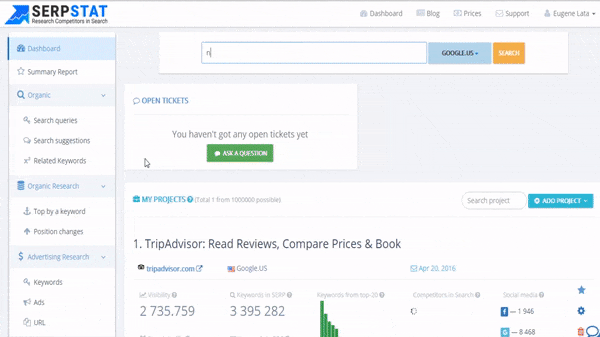Ann Smarty on How to Do Keyword Research
Conducting keyword research is a bit rough these days. There are just so many people online, so many businesses, so many new startups and websites competing for Google search positions. Keywords are quickly monopolized, mercenary tactics and big budgets from multi-national corporations eating up all the good ones.
That leaves smaller guys, or those just starting out, struggling to carve out a little niche for themselves. It also makes it difficult to know exactly how to corner a keyword, and which ones to target. What is worth putting the time and effort into, and what happens if you fail?
Thankfully, in many ways the process is the same. But there are some tools and tips that can help you keep up with changes.
Have The Right Tools Handy
This is an awesome growth hacking tool that only starts with keyword research (though it goes above and beyond most tools).
It also offers search analytics so you can keep up on the latest data produced by your keywords, advertising analysis to make sure your ads are working for you, content marketing ideation to produce better content in your niche, and a ton more.
It is surprisingly affordable, and once you’ve tried it, you can pay for their 3 year plan, which cuts out a full 40% of any tier.
Bulk Google Suggest Tool

I think of this one as another obvious necessity, and pretty much Google’s backup keyword tool. It gives you access to hundreds of keywords, some of which are much more obscure. It also cuts through the noise to give you a better look at what works for you.
I like this tool because it is super easy to use, and it gives you some more detailed insight than Google – a rather broad picture kind of tool – does. It will give you a pretty good list to start from, between the two, and you can narrow it down from there.
[Ed note/disclaimer: The Bulk Google Suggest Tool is a product of Internet Marketing Ninjas, Ann’s company.]
Seed Keywords

Are you utilizing your best resource? Probably not, and Seed Keywords wants to change that. You create a scenario where you ask a question, and send it out to your contacts.
They reply back with what keyword they would use for that scenario. What you end up with is an awesome collection of data from people you know and trust, all real people who have a more organic approach to keywords that a database just won’t give you. To see how it works you can run example scenarios, as well.
Cyfe

Cyfe is a multi-purpose marketing platform that you can use for just about anything from customer service to web analytics. I like using it to archive Twitter search results containing my keyword because it’s a great source of natural-language context I use when writing my articles.
Know The Proper Metrics For Measuring Keyword Viability
Moz took this to a whole new level. They claim to have created a formula, which looks at four components associated with each keyword:
- Difficulty
- Importance
- Opportunity
- Volume
From there, they have say that you can follow the formula of:
KP = sqrt(V) * (1 – KD / 100) * (KO / 100) * I
The formula brings up a good point about what to look for in a good keyword. You want something that won’t be too difficult to crack (and so doesn’t have a major competitor like Walmart, Amazon, or XFinity, for example). It should have the potential to be high volume in search. The opportunity for organic traffic should be on the higher end. And it should be important for you, a keyword that you can really see yourself exploiting.
It’s easy to find those keywords using the aforementioned Serpstat. Just use filters to specify the competition (I used 0%-5% competition) and sort results by search volume to see the more popular results on top:

Think Entities, Not Just Keywords
This may seem a little counter intuitive, not just because you are literally trying to find keywords right now, but also because it goes against every bit of advice that you have probably heard in the past. But it works, and here is why: Google is getting smarter.
Already an incredible tool, Google algorithm has been expanding, adjusting, adapting and improving for years. The engine of today is much different than what it was in, say, 2010, and we are seeing the fruits of those labors all the time.
One major way is in how it ranks. Keyword stuffing and phishing content used to be a major pox for any content creator who knew they were up against shady spammers. Now, Google’s crawlers and bots have gotten better than ever at recognizing value, and part of that is looking beyond keywords.
When you write content, make sure to include related areas, organizations, companies, names, etc. These are the signals to Google of high-quality well-researched content.
That doesn’t mean you should give up on keywords, but rather you should be using both.
Search engine optimization is still the most effective way to build relevant traffic for your site, so keyword research is very important.
In the year 2016, it might feel like keyword research has become so complicated that it is practically a mystical art. But with the right tools and approach it can be simple, if time consuming. What remains true is that it is worth it.
[Ed (Randy’s) note: Ann Smarty is guest blogging by invitation. If you are interested in guest blogging on this site, and your article meets our ethical marketing focus, please reach out and talk with me about your ideas in social. Head’s up… you must be known to the marketing, social media, or SEO communities and willing to share the post to qualify to be a guest blogger.]







